肾内科开展视频会诊的十条建议
IF 3.9
2区 医学
Q1 UROLOGY & NEPHROLOGY
引用次数: 0
摘要
自 COVID-19 大流行以来,视频会诊在肾脏病学中的使用越来越多,其目的是解决 F2F 门诊能力有限的问题,以及患者对就医时感染风险的担忧。肾脏病学家从经验中学会了利用视频会诊提供常规随访,以及对不舒服的病人进行临时分流。视频会诊的优势包括方便快捷、避免诊所开销从而节约成本,以及减少医疗碳足迹。由于肾病学家考虑到气候变化及其影响,后者的意义日益重大。视频会诊并不是克服肾脏病学挑战的灵丹妙药,也存在风险,例如在需要重新设计路径和保持 F2F 评估时。考虑报销、处方和文档等实际问题也同样重要。有些临床医生可能希望在家进行视频会诊,以节省通勤时间,但这也需要慎重考虑。另一个考虑因素是数字鸿沟,应为信息技术水平较低或无法进入数字世界的患者提供支持。有特殊需要的病人,如视力或听力受损的病人以及有语言障碍的病人也需要考虑。我们认为,视频会诊是肾脏病治疗组合中不断发展和壮大的一部分。我们认为,视频会诊的主要作用是为病情稳定、懂信息技术的门诊患者提供常规随访,尤其是在医疗服务提供者具有连续性、医疗服务覆盖面广的情况下。本文章由计算机程序翻译,如有差异,请以英文原文为准。
Ten tips to carry out video consultations in nephrology
Video consultations have seen increasing use in nephrology since the COVID-19 pandemic with an aim to address constraints in F2F outpatient capacity and also patients’ concerns around risks of infection when attending healthcare facilities. Nephrologists have learned through experience to use video consultations for providing routine follow up but also for ad-hoc triage of unwell patients. Advantages of video consultations include convenience, cost savings through avoiding clinic overheads, and reducing the carbon footprint of care. The latter is increasingly relevant as nephrologists consider climate change and its implications. Video consultations are not a panacea to overcome challenges in nephrology and risks also exist for example when it comes to redesigning pathways and maintaining access to F2F assessments when required. It is equally important to consider practical aspects such as reimbursement, prescribing, and documentation. Some clinicians may wish to carry out video consultations from home to save time spent in commute but this, too, requires careful thought. Another consideration is the digital divide and support should be provided for patients who are less IT literate or who have no access to the digital world. Patients with special needs such as those with visual or hearing impairment and those with language issues also require consideration. We view video consultations as a developing and growing part of the portfolio of renal care. We see their main role in providing routine follow up to stable and IT literate outpatients, particularly where there is provider continuity and where care is provided across a large geographical area.
求助全文
通过发布文献求助,成功后即可免费获取论文全文。
去求助
来源期刊

Clinical Kidney Journal
Medicine-Transplantation
CiteScore
6.70
自引率
10.90%
发文量
242
审稿时长
8 weeks
期刊介绍:
About the Journal
Clinical Kidney Journal: Clinical and Translational Nephrology (ckj), an official journal of the ERA-EDTA (European Renal Association-European Dialysis and Transplant Association), is a fully open access, online only journal publishing bimonthly. The journal is an essential educational and training resource integrating clinical, translational and educational research into clinical practice. ckj aims to contribute to a translational research culture among nephrologists and kidney pathologists that helps close the gap between basic researchers and practicing clinicians and promote sorely needed innovation in the Nephrology field. All research articles in this journal have undergone peer review.
 求助内容:
求助内容: 应助结果提醒方式:
应助结果提醒方式:


